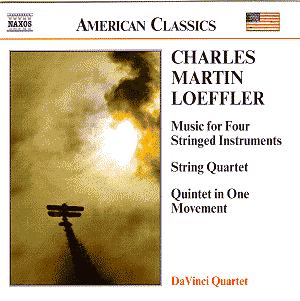Whatever
"American" Style is, Charles Martin Loeffler never utilised
it, any more than did Stravinsky or Rachmaninov. Born in Alsace
and educated in Paris, Loeffler arrived in the USA with his family
to take over in 1882 the job of concertmaster of the Boston Symphony
Orchestra, a position he held until 1903 when he resigned to devote
himself to composing. And compose he did, drawing appropriately
from both German and French traditions. By the time of his death
his works populated the programs of most major US symphony orchestras,
but have all but disappeared today.
Loeffler’s
masterpiece is the Deux Rapsodies for piano, viola, and
oboe, which deserves a place among the half dozen greatest piano
trios ever written; the definitive recording of it is listed above
so that any who don’t have it can easily obtain it. Unfortunately
none of the works on the disk at hand, or any other work by Loeffler
yet made available, approaches the Rhapsodies in level of craftsmanship
or inspiration, but one keeps hoping that the continuing exploration
of Loeffler’s oeuvre will uncover another brilliant jewel,
or perhaps at least a jet brooch or two.
These
artists are all experienced performers and teachers of their respective
instruments and have previously been active in the area of neglected
women composers. Now they have democratically extended their concern
and their considerable musical skills to neglected males as well.
Throughout they play beautifully, intelligently, and with compassion,
and receive clear well balanced recording.
These
works have the open lyricism of the Dvořák quartets, but
are more rigorously crafted, and with unmistakable echoes of Debussy.
The Music for four Stringed Instruments was written as
an elegy to the first US aviator to die in what used to be called
"The Great War" before a greater war usurped its position.
It contains a devilishly difficult cello part, in which the cellist
is required to retune her instrument several times while playing.
The Kohon Quartet recording has been current for a number of years
in an anthology of US quartet music and is also a distinguished
recording, but the DaVinci group play with more assurance and
lyric grace and a better sense of the structure of the work. They
achieve a good balance of hope and sadness in the "Easter"
movement. Even if you have the Kohon recording you will want this
one for the other music, particularly the Quintet, evidently the
only work ever written for this particular combination of instruments.
The theme from one of the Rapsodies moves sinuously through the
Quintet at one point.
Paul
Shoemaker

![]() DaVinci Quartet:
Jerilyn Jorgensen, Wendolyn Olson, vv.; Margaret Miller, va.;
DaVinci Quartet:
Jerilyn Jorgensen, Wendolyn Olson, vv.; Margaret Miller, va.; ![]() NAXOS 8.559077 [66.46]
NAXOS 8.559077 [66.46]